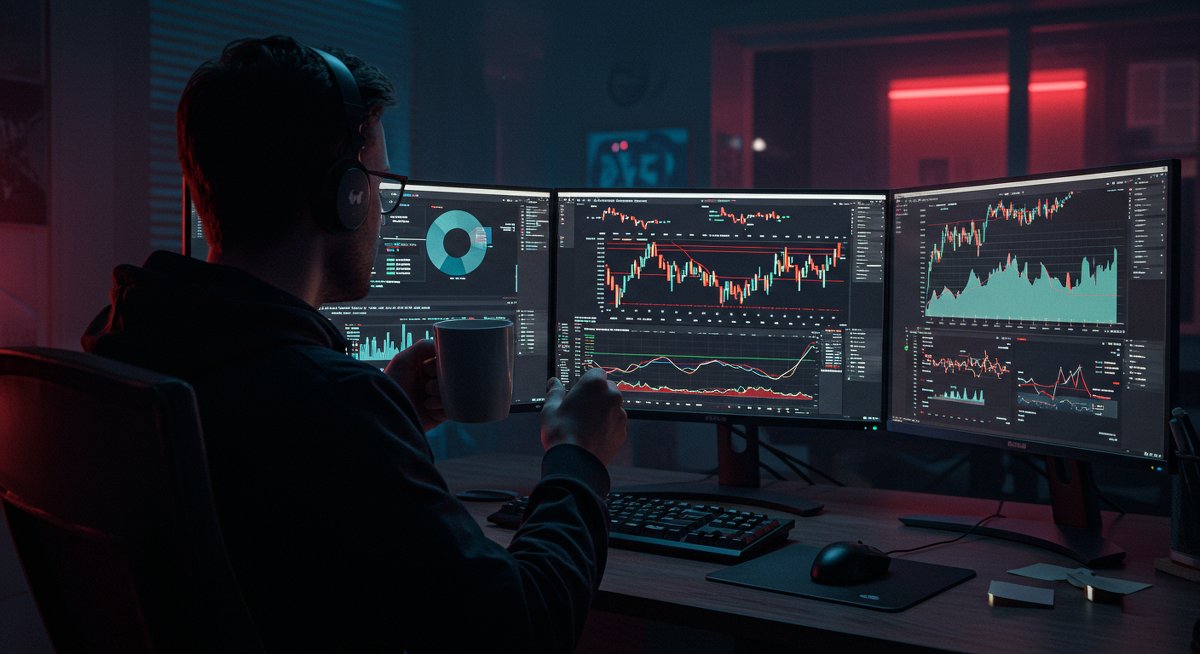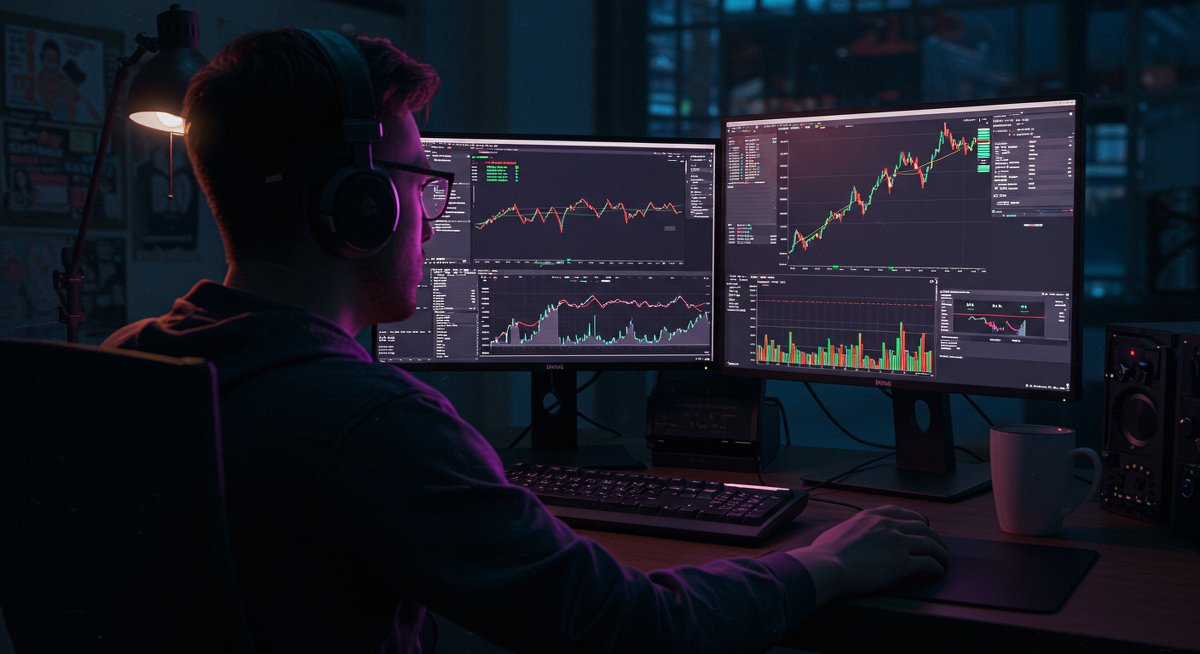Why This Story About Bitcoin and Banks Got My Attention
So, I was scrolling through r/Bitcoin the other day, and this post caught my eye. A lawyer got kicked out of her bank simply for buying Bitcoin. It's one of those stories that makes you stop and think, especially if you're moving money around to trade crypto.
Now, there might be more to the story than we know. Maybe there were other factors at play. But the core issue is clear: banks are watching crypto transactions, and they're not always happy about it.
This isn't just about one person's bad luck. It highlights the ongoing tension between traditional finance and the crypto world. And for those of us trading internationally, it raises some serious questions about privacy, access, and control over our own money. Think about it – are you really in control of your funds if a bank can cut you off for buying Bitcoin? It also made me wonder about how banks treat crypto differently based on location. Do some countries have more relaxed policies?
This situation isn't necessarily new, but it is becoming more common. As Bitcoin and other cryptos become more mainstream, traditional institutions are grappling with how to deal with this new asset class. We've seen increasing regulation, but also increasing wariness from banks.

Here's What Actually Happened
Okay, let's break down what we know from the Reddit post. A client, presumably one of the lawyer's clients, was flagged for withdrawing funds to purchase Bitcoin. This triggered a review by the bank, including a phone grilling about the nature of the transaction. Shortly thereafter, the client received a letter informing them that their account was being closed and they were asked to find a new bank.
It's important to note that the poster explicitly stated the bank's reasoning might have had political overtones. This could mean any number of things, but it suggests the bank might have had some pre-existing bias against Bitcoin or perhaps against the client themselves. Regardless, the stated reason was the Bitcoin transaction.
The fact that the bank grilled the client over the phone is significant. It shows they were actively investigating the transaction, not just passively monitoring it. This suggests the bank has specific protocols in place for dealing with crypto-related transactions. It also tells us that the client may have been moving a relatively large amount of money, because it triggered closer scrutiny.
We also have to consider the bank's perspective here. Banks are heavily regulated, and they're responsible for preventing money laundering and other illicit activities. Crypto, with its pseudo-anonymous nature, can be seen as a higher-risk area. So, banks might be extra cautious when dealing with crypto transactions, especially large ones. But even then, the question remains – is it the bank's place to decide what we do with our money?
What This Means for Your Crypto Trading
So, you might be thinking, "Okay, that's one person's story. Why should I care?" Well, if you're actively trading crypto, especially across borders, this has some pretty significant implications.
First, it highlights the importance of diversification – not just in your crypto portfolio, but also in your banking relationships. Relying on a single bank account to fund all your crypto activities could leave you vulnerable if that bank decides to shut you down. Spreading your funds across multiple accounts can mitigate this risk.
Second, it underscores the need for privacy. While Bitcoin transactions are recorded on a public ledger, there are ways to enhance your privacy. Using a VPN, mixing services, or privacy-focused cryptocurrencies can make it harder for banks (and others) to track your activity.
Third, be aware of your bank's policies. Some banks are more crypto-friendly than others. Do some research and find banks that are open to crypto transactions. Look for banks that have clear policies on crypto and that don't automatically flag or block such transactions.
Ultimately, this incident serves as a reminder that the traditional financial system isn't always aligned with the crypto world. We need to be proactive in protecting our access to crypto and our financial freedom. It also might mean you should start looking into decentralized finance (DeFi) as a way to bypass some of these banking restrictions.
The Stuff Nobody Talks About: Risk Management and Backups
Let's get real – this situation highlights a few key risks that often get overlooked in the crypto space. I'm not trying to spread FUD, but these are things you need to consider.
The biggest risk here is centralization. We often talk about the decentralization of crypto, but in reality, most of us still rely on centralized exchanges and banks to access the crypto market. This creates a single point of failure. If a bank freezes your account, or an exchange goes down, you could lose access to your funds.
Another risk is regulatory uncertainty. Crypto regulations are still evolving, and they vary widely from country to country. What's legal in one jurisdiction might be illegal in another. This creates a compliance challenge for both individuals and businesses.
Then there's the issue of financial surveillance. Banks are required to report suspicious activity to government agencies. This means your crypto transactions could be monitored and scrutinized. This might not be a problem if you're just buying and holding Bitcoin, but it could raise red flags if you're actively trading or using crypto for other purposes.
So, how do you manage these risks? First, educate yourself. Understand the regulations in your jurisdiction and the policies of your bank and exchange. Second, diversify your risk. Don't put all your eggs in one basket. Use multiple exchanges, wallets, and bank accounts. Third, consider using privacy-enhancing tools and techniques. Finally, have a backup plan. Know what you'll do if your account gets frozen or your exchange goes down.
If You're Trading from Outside the US
Now, if you're trading crypto from outside the United States, there are some additional considerations to keep in mind. The regulatory landscape varies significantly from country to country. Some countries are very crypto-friendly, while others are much more restrictive.
For example, some countries have strict capital controls that limit the amount of money you can move in and out of the country. This can make it difficult to fund your crypto accounts or to withdraw your profits.
Other countries have specific tax rules for crypto. You might be required to pay taxes on your crypto gains, or you might be able to deduct your losses. It's important to understand the tax rules in your jurisdiction to avoid any penalties.
Currency exchange rates can also play a role. If you're trading crypto in a foreign currency, you need to be aware of the exchange rate fluctuations. These fluctuations can impact your profits and losses.
Finally, cultural attitudes towards crypto can vary. In some countries, crypto is widely accepted and used. In others, it's still viewed with suspicion. This can affect your ability to find crypto-friendly banks and services.
It's crucial to research the legal and financial landscape in your specific country before engaging in crypto trading. Check your local crypto regulations, but also talk to a financial advisor, and potentially a tax professional. This might sound complicated, but better safe than sorry.

Actually Doing This Stuff: Practical Steps
Okay, so how do you actually protect yourself from getting blacklisted by your bank for buying Bitcoin? Here's a step-by-step guide:
Research Crypto-Friendly Banks: Not all banks are created equal. Some are more open to crypto transactions than others. Look for banks that have clear policies on crypto and that don't automatically flag or block such transactions. You can start by searching online for "crypto-friendly banks in [your country]".
Diversify Your Bank Accounts: Don't rely on a single bank account to fund all your crypto activities. Spread your funds across multiple accounts to mitigate the risk of getting shut down.
Use a VPN: A VPN (Virtual Private Network) encrypts your internet traffic and hides your IP address, making it harder for banks (and others) to track your online activity.
Consider Using a Crypto Mixer: A crypto mixer is a service that mixes your crypto with other users' crypto, making it harder to trace the origin of the funds. Be aware that some mixers have been linked to illicit activities, so use them with caution.
Be Mindful of Transaction Sizes: Large transactions are more likely to be flagged by banks. Consider breaking up large transactions into smaller ones to avoid raising red flags.
Communicate with Your Bank (Carefully): If your bank asks about your crypto transactions, be honest but also be discreet. Explain that you're buying Bitcoin for investment purposes, but don't provide unnecessary details.
Explore Decentralized Finance (DeFi): DeFi platforms offer a way to access financial services without going through traditional banks. Consider using DeFi platforms for some of your crypto activities.
My Take on All This
Here's what I think. The fact that a bank would kick someone out for simply buying Bitcoin is concerning. It shows that the traditional financial system is still resistant to crypto, and that they're willing to punish people for participating in this new asset class.
I'm not saying that banks are inherently evil. They have a responsibility to comply with regulations and to protect their customers from fraud. But I do think they need to be more open-minded about crypto, and they need to treat crypto users fairly.
Ultimately, this incident serves as a wake-up call for the crypto community. We need to be proactive in protecting our access to crypto and our financial freedom. We need to educate ourselves, diversify our risk, and explore alternative financial systems like DeFi.
Maybe I'm wrong, and this is just an isolated incident. But I suspect it's a sign of things to come. As crypto becomes more mainstream, we can expect to see more conflict between the traditional financial system and the crypto world. And it's up to us to navigate this conflict in a way that protects our rights and our freedom. We can start by opening the discussion and talking about these problems to find better solutions for everyone.
" , "tags_used": ["bitcoin", "crypto-trading", "international-trading", "risk-management", "regulations", "beginner-guide"], "structure_selected": "advanced-masterclass